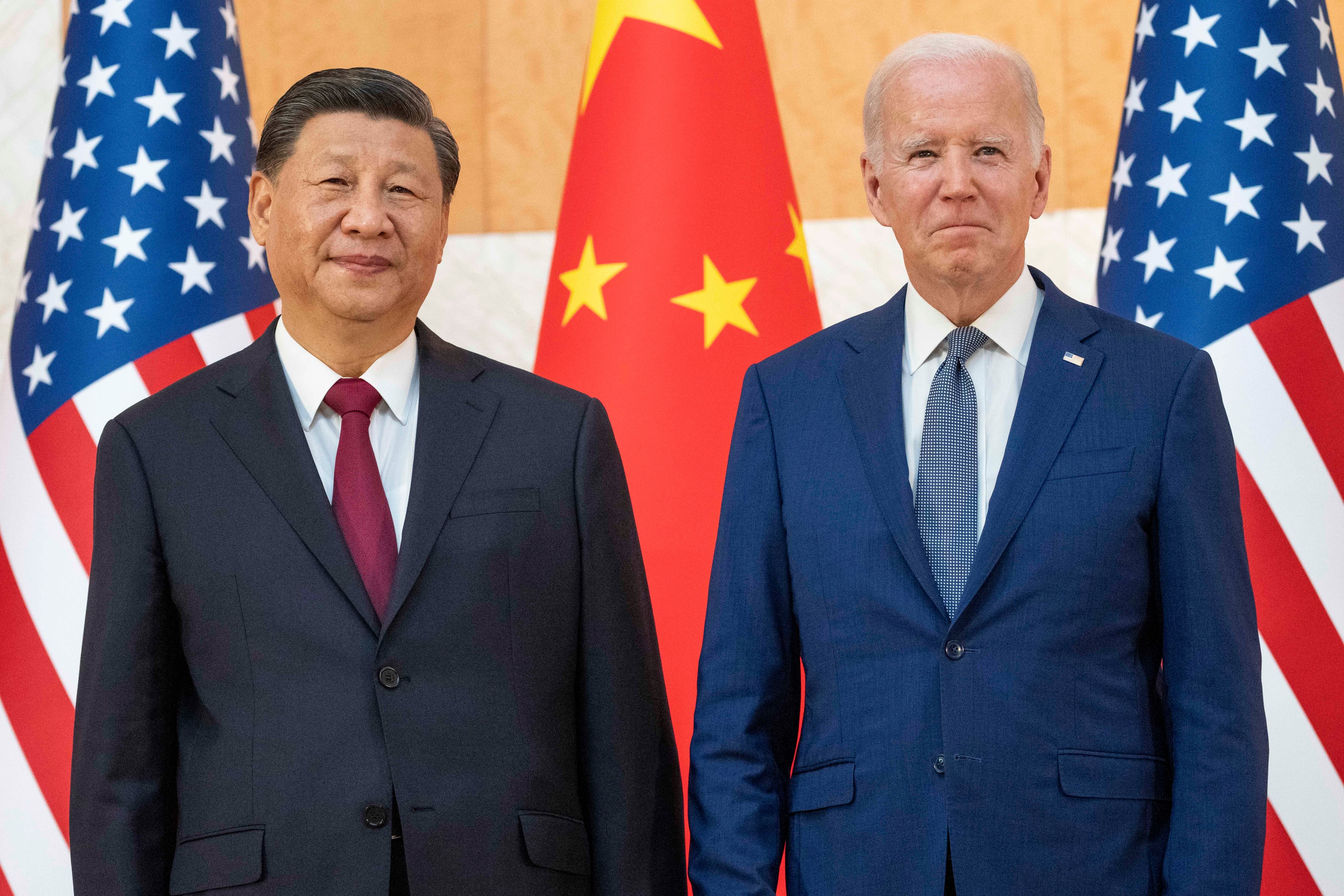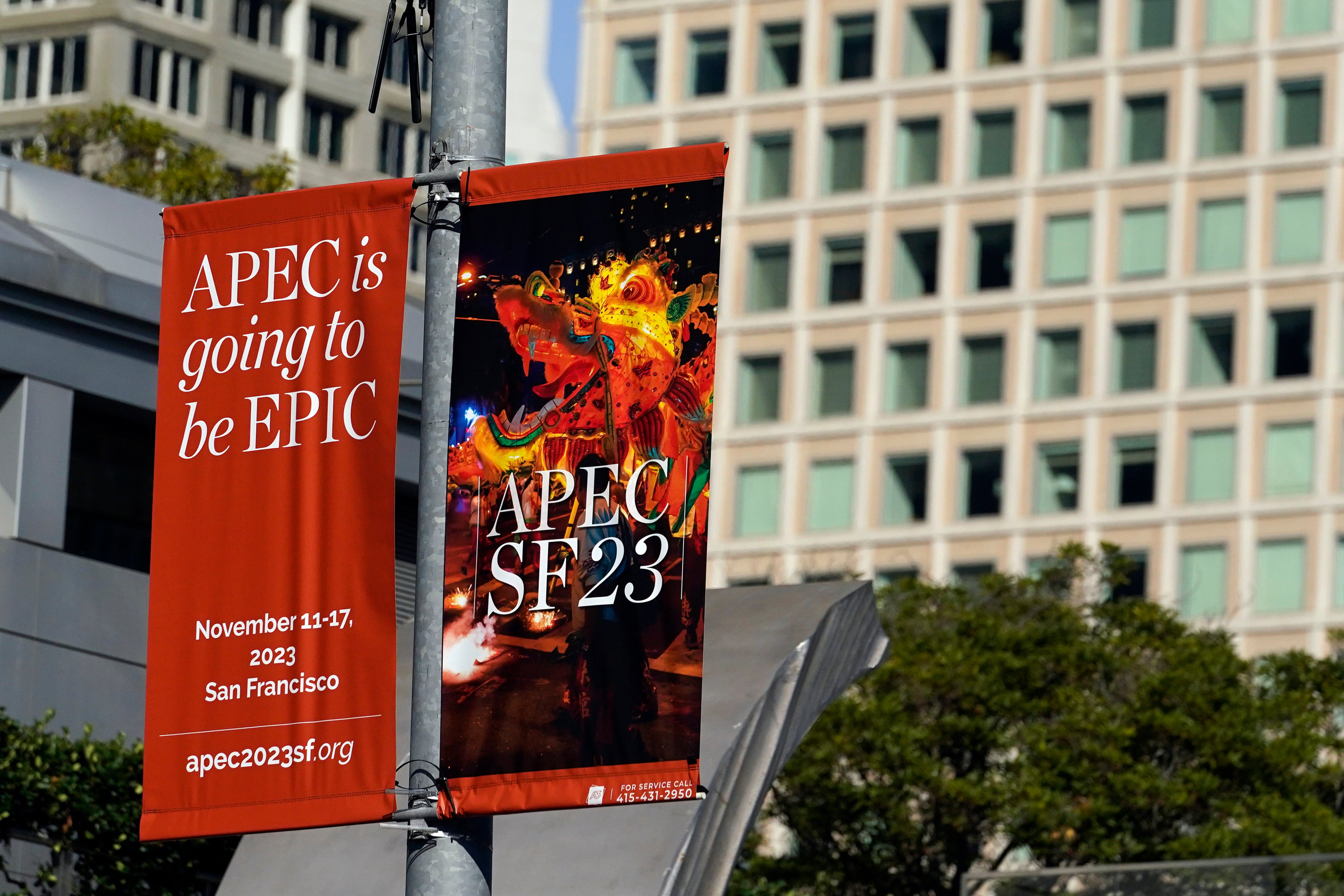Biden and Xi Jinping to meet for first time since China spy balloons scandal
Tensions have been raised between the US and China since February’s spy balloon incident
President Joe Biden’s sit-down with Xi Jinping on Wednesday will be heavily focused on encouraging the Chinese leader to restore communications between the US Defence Department and the People’s Liberation Army after a more than year-long rupture exacerbated by the shooting down of a Beijing-owned espionage balloon in February.
The call to resume regular communications, as well as informal exchanges, is aimed at preventing any isolated incident involving the two militaries from spiralling out of control into what could become a shooting war between nuclear-armed nations.
Mr Biden and Mr Xi are set to meet Wednesday afternoon when both leaders are in San Francisco for the Asia-Pacific Economic Cooperation leaders’ summit, their first interaction since a bilateral meeting on the sidelines of last year’s G20 summit in Indonesia.
The sit-down, which will be held at an as-yet undisclosed location, follows February’s controversy over the spy balloon that made its way across the continental United States in February.
It will cap months of careful diplomatic efforts by a range of top administration officials to lay the groundwork for a restoration of head-of-state level talks after the balloon incident, which exacerbated tensions brought on by then-House Speaker Nancy Pelosi’s August 2022 visit to Taiwan.
The two leaders are set to discuss what White House Press Secretary Karine Jean-Pierre described in a statement as “issues” in the bilateral relationship, as well as “the continued importance of maintaining open lines of communication, and a range of regional and global issues”.

But administration officials and experts say the benign, diplomatic language used by the White House glosses over the true stakes: an end to nine months of no communications between the US and Chinese defence establishments that has left the two superpowers at risk of getting dragged into a violent conflagration.
Mr Biden himself provided a window into his thinking just hours before he departed Washington, when he answered questions after delivering remarks on this year’s National Climate Assessment.
Asked about what he’d consider “success” coming out of Wednesday’s meeting with Mr Xi, Mr Biden replied: “To get back on a normal course of corresponding: being able to pick up the phone and talk to one another when there’s a crisis, being able to make sure our militaries still have contact with one another”.
What he described – top US military officers having regular communication with their PRC counterparts – was considered run-of-the-mill as recently as last year, before Ms Pelosi’s trip to Taiwan raised hackles in Beijing, and before the balloon shutdown led Chinese officials to break off contacts entirely, despite numerous entreaties from the White House, State Department, and top Defence Department officials to arrange meetings or calls between Pentagon brass and PLA bosses.
One now-infamous example of these informal exchanges took place during the waning days of the Trump administration, when General Mark Milley, then-chair of the Joint Chiefs of Staff, reached out to his PLA counterpart, General Li Zuocheng, in response to what he described to the Senate Armed Services Committee as “concerning intelligence” indicating that Chinese officials feared then-president Donald Trump would order a surprise attack on China.
In testimony delivered on 28 September 2021, eight months after Mr Trump left office, Gen Milley told senators: “I know, I am certain, that President Trump did not intend to attack the Chinese and it was my directed responsibility to convey presidential orders and intent … my task at that time was to de-escalate. My message again was consistent: stay calm, steady, and de-escalate. We are not going to attack you.”
When news of Gen Milley’s conversations with Gen Li first surfaced in a book by reporters Bob Woodward and Robert Costa, Mr Trump and other Republicans accused him of committing treason, and more recently the disgraced ex-president called for the now-retired general to be put to death.
But Jon Wolfsthal, the director of global risk at the Federation of American Scientists, told The Independent that Gen Milley’s outreach to Gen Li was the exact sort of thing Mr Biden hopes Mr Xi will agree to allow when they meet tomorrow.
“What the US has been trying to do under the Biden administration is establish a regular military-to-military officer dialogue. We have had foreign ministry contacts, we’ve had track-two and track-1.5 dialogues, but it’s been extremely hard to get the PLA to sit down with the US military… so that they can have an open line of communication, so that if something goes sideways, they can pick up the phone and call their counterpart,” he said.

Mr Wolfsthal also said the State Department has been pushing for years to establish so-called warm lines — open communication channels between Foggy Bottom and Beijing — akin to what the US has had with Russia’s foreign ministry since a 1987 agreement between the US State Department and the Soviet Union established Nuclear Risk Reduction Centres in each respective country.
Other open lines between the US and the Russian defence establishment include the Washington-Moscow Direct Communications Link — the “hotline” between the Pentagon and Kremlin that was established in 1963 following the Cuban Missile Crisis — and single-purpose deconfliction channels that have been set up to avoid mishaps between Russian and US forces in Syria and in the area affected by Russia’s war on Ukraine.
A senior administration official who briefed reporters on Mr Biden’s plans for the meeting said the president will press Mr Xi to agree to establish “a comprehensive set of interactions at the military to military level”.
“That means a dialogue that the Secretary of Defence would have with his counterpart,” as well as “commanders’ discussions and operators’ engagements” between US and Chinese soldiers, sailors and airmen at various levels.
The official added that “some mechanisms that were used during the Cold War’ could be “repurposed to ensure that when us and Chinese forces are operating in closer proximity, we have greater confidence that in a crisis, or if there’s inadvertence, there’d be the ability to communicate”.
“We think that's responsible. We've been a superpower for a long time. We understand the importance of these things that can prevent unintentional escalation or crisis,” the official said.
Thus far, the lack of such facilities and the absence of a permanent link between Beijing and Washington hasn’t caused nuclear proliferation or defence experts undue stress because until recently, China has not kept nuclear weapons at the ready in the same way that the US and Russia have since the days of the Cold War.
But Mr Wolfsthal told The Independent that China’s military posture in numerous Indo-Pacific hotspots had raised the stakes and made reopening communications between US forces and China all the more vital as Mr Biden pursued what he has described as “strategic competition” with Beijing, and as the US continued to come into contact with Chinese forces during operations in international waters.
“I think the question here is whether President Xi and President Biden can get their respective militaries to have a regular process for communication … whether that is to meet regularly and say: ‘Look, this is why we do freedom of naval operations in your in these areas. These are where our red lines are, this is what we think would be useful to achieve together,’” he said. “In a crisis, those things can make the difference between escalation and de-escalation”.
One veteran Democrat on the Senate Foreign Relations Committee, New Jersey Senator Robert Menendez, offered a similar assessment when approached for comment by The Independent on Tuesday.
Mr Menendez, who chaired the upper chamber’s foreign affairs panel until he stepped down last month after being indicted for bribery and conspiracy to act as a foreign agent for Egypt, said he considers it “very important” for Mr Biden to seek a restoration of ties.
“We cannot afford a mishap or a consequential incident that could evolve into something greater. We need to restore it and I hope that’s accomplished with the President,” he said.
And despite Mr Trump’s past condemnation of Gen Milley for speaking with his Chinese opposite number, Mr Biden’s effort to re-establish the military-to-military channels between Washington and Beijing garnered praise from the top Republican on the Senate Foreign Relations Committee, Senator James Risch of Idaho.
Mr Risch told The Independent on Tuesday that re-opening those ties should be “a high priority” for Mr Biden and for the US.
“One of the things we worry about most is a mistake. And if you have good open communications with the other side, at least you’ll avoid a mistake,” he said. “I think it’s important. I’m not sure that the Chinese are as convinced as we are that how important it is, but we have a long history and a long experience with this, and it’s a good thing to do”.
Eric Garcia contributed reporting from Capitol Hill
Join our commenting forum
Join thought-provoking conversations, follow other Independent readers and see their replies
Comments
Bookmark popover
Removed from bookmarks